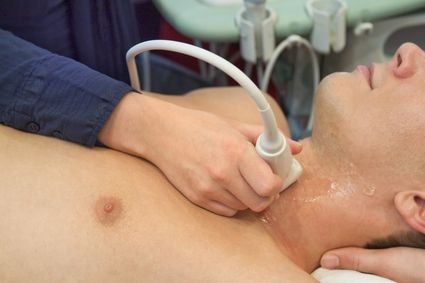Hyperthyroidism: causes, symptoms and treatment options
The thyroid gland is one of the most important endocrine glands and a producer of hormones cruicial for proper function of human body. The main hormones produced by the thyroid gland are triiodothyronine (T3), tetraiodothyronine (T4 or thyroxine) and calcitonin, which has a certain role in calcium level adjustment in the human body. Hyperthyroidism is caused by over production of some or all thyroid hormones.
Causes of hyperthyroidism
Hyperthyroidism is most frequently caused by autoimmune infection, goitre (thyroid gland swelling), some thyroid gland tumors or in case of administration of high doses of thyroid gland hormones for therapeutic reasons.
Symptoms
The main symptoms of the overactive thyroid gland include goitre, excessive sweating, hot skin, loss of hair, nail splitting (onychoschizia), tiredness, higher or lower appetite, loss of weight, diarrhea, finger or body shaking, insomnia (sleeplessness), double vision, exophthalmos (eye bulging – mainly a symptom of Graves-Basedow’s disease) and neuropsychic symptoms such as restlessness, lack of concentration, frequent mood changes, fear, nervosity or fast speaking.
Complications
The most dangerous complications of an overactive thyroid gland are cardiovascular complications because a severe hyperthyroidism may have a negative impact on hearbeat frequency and may even result in a heart attack.
Tests and examinations
Your doctor will have to perform some tests and examination for proper diagnosis of hyperthyroidism. First of all he or she will probably ask you whether you or some of your family members or relatives have ever suffered from an overactive thyroid. The doctor will also ask you whether you suffer from an autoimmune disease, such as Diabetes or Celiac Disease or whether you have ever undergone a radiotherapy treatment of the neck or chest.
After that the doctor will palpate the thyroid to check its shape and size. Your blood will be drawn to check the hormone levels. Finally your thyroid sonography will be performed, including biopsy, if necessary.
Treatment
The treatment options depend on the cause of the disease. If the condition was caused by an infection, the treatment focuses just on symptoms as the problem is only temporary and as soon as the infection wears off the proper thyroid function is restored.
If the condition is caused by Graves-Basedow’s disease your doctor will usually give you a prescription for thyreostatic drugs. If your doctor finds it necessary you might also be given some heart rate lowering drugs (beta blockers). If everything goes well your thyroid function may be restored to normal within 2 or 3 months. However you will probably have to take the drugs for additional 12 to 18 months.
If the condition cannot be treated using drugs, it will be necessary to remove the thyroid (thyroidectomy). This is a surgery, which deals with the over active thyroid problem but you will be administered the hormones for the rest of your life.
A less invasive option to thyroidectomy is radioactive iodine therapy. The patient is administered a radioactive iodine, which is absorbed by overactive thyroid cells. These cells are then killed by radioactivity. However this treatment option is unavailable to pregnant (expecting) women.
Thinks to avoid
Try to avoid stress. Get some rest and use various relaxation techniques. Do not drink alcohol, black coffee. Avoid sunbathing. If you suffer from excessive sweating wear cotton wool clothes, which do not irritate your skin. Do not eat food containing iodine. If you suffer from vision or eye problems, wear sun glasses and use appropriate eye drops. Follow your doctor’s recommendations as successful recovery depends – to a great extent – on your co-operation with the doctor.
| Written by: | Michal Vilímovský (EN) |
|---|---|
| Education: | Physician |
| Published: | November 9, 2012 at 7:19 AM |
| Next scheduled update: | November 9, 2014 at 7:19 AM |
Get more articles like this in your inbox
Sign up for our daily mail and get the best evidence based health, nutrition and beauty articles on the web.


Ache in left arm that you should not ignore
Alkaline water dangers: why you should not drink it
How to Avoid Sleepiness While Studying?
23 Foods That Increase Leptin Sensitivity
Low dopamine (e.g. dopamine deficiency): causes, symptoms, diagnosis and treatment options
Swollen taste buds: the ultimate guide to causes, symptoms and treatment
Thin endometrial lining: causes, symptoms, diagnosis and treatment
Pimples inside nose: the complete guide
Holes in tonsils: definition, symptoms, treatment and prevention
How to deal with an ingrown hair cyst
Allegra vs. Zyrtec vs. Claritin
Allergy to penicillin and alternative antibiotics
How to get rid of phlegm (excessive mucus) in throat? Detailed guide to medical and home remedies, symptoms and causes
What causes stomach ache after meals?
Liver blood test results explained